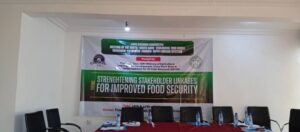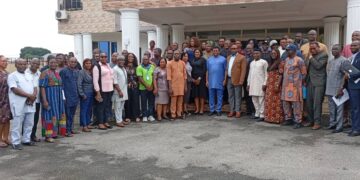By Asuquo Cletus
Key stakeholders across Nigeria’s South-South geopolitical zone on Wednesday converged in Calabar, Cross River State, for the 14th Steering Committee Meeting of the South-South Agro-Ecological Zone of the Research Extension Farmers Input Linkage System (REFILS), with a renewed commitment to tackling the deepening food crisis in the region.

Held at Treasure Land Hotels, the forum, which returned to Cross River for the first time in over a decade, brought together researchers, policymakers, farmers, lawmakers, and private sector actors under the theme: “Strengthening Stakeholder Linkages for Improved Food Security.”
Speaking at the opening ceremony, the State Commissioner for Agriculture and Irrigation Development, Johnson Ebokpo, said the hosting of the meeting was made possible by the unwavering support of Governor Bassey Edet Otu, describing the gathering as both timely and strategic in view of the pressures mounting on the nation’s food systems.
“This is the first time in over 10 years that Cross River State is privileged to host this important meeting,” Ebokpo stated. “In the past, our participation in REFILS meetings was limited by funding constraints. I commend our visionary Governor, Senator (Apostle) Bassey Edet Otu, for approving the resources that made this hosting possible.”
He highlighted several interventions under the state’s People First agenda, including the procurement of 3.5 million improved oil palm nuts from the Nigerian Institute for Oil Palm Research (NIFOR), distribution of one million coffee seedlings (Arabica and Robusta) as part of a 30 million target, and cassava stem multiplication initiatives.
Ebokpo also listed the launch of Project GROW to support agribusiness, a cocoa rehabilitation strategy, the distribution of 77 motorbikes to strengthen extension services, and a collaborative pilot on wheat cultivation with research institutes.
“These interventions are not isolated efforts,” he said. “They form part of a broader strategy to empower our farmers with the right inputs, guided by research and extension systems, to transform agriculture into an economic driver.”
Also speaking, Programme Manager of the Cross River Agricultural Development Programme (CRADP), Bassey Edu, described the forum as a critical platform to rebuild the region’s agricultural value chain.
“It is with great pleasure I welcome you all to this 14th Steering Committee Meeting of the South-South Agro-Ecological Zone REFILS,” he said. “This platform allows us to deliberate on challenges and explore innovative solutions for sustainable agricultural development.”
Edu also praised the Commissioner and the state governor for their leadership and commitment to agricultural reforms.
Delivering his keynote address, South-South REFILS Coordinator, Dr. Olushegu Solomon, called for improved synergy among research institutions, extension agents, farmers, and policymakers, warning that innovations without collaboration often fail to make it from laboratories to farms.
“Food security is no longer just a development issue—it is a national emergency,” Solomon said. “With climate change, rising population, and shrinking resources, no single institution can solve these problems alone. We must bridge the gap between research and impact.”
He urged participants to explore technologies, share field-tested practices, and co-develop strategies specific to the South-South agro-ecological zone.
On his part, Chairman of the Cross River State House of Assembly Committee on Agriculture, Bette Obi, pledged legislative backing for agricultural innovations. He stressed that policy and legal frameworks are critical to sustaining government efforts and attracting investments into the sector.
“We are committed to passing laws that strengthen our agricultural institutions,” Obi said. “Food security is not only about production—it is about systems that support farmers, encourage investment, and ensure sustainability.”
The two-day meeting is expected to produce resolutions on a range of pressing issues, including access to inputs, effective extension service delivery, climate-smart agriculture, research-to-practice linkages, and improved market access for smallholder farmers.











